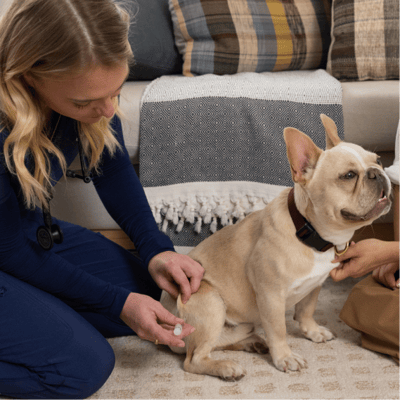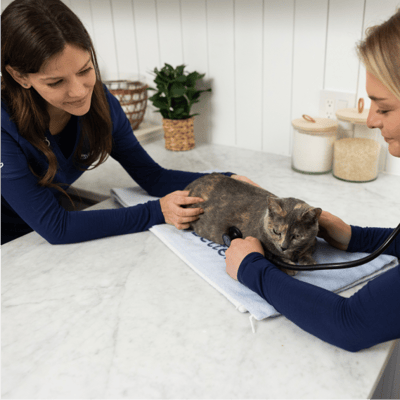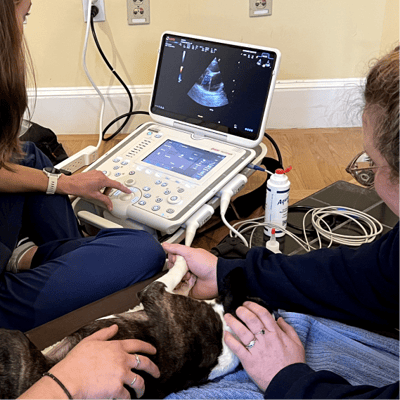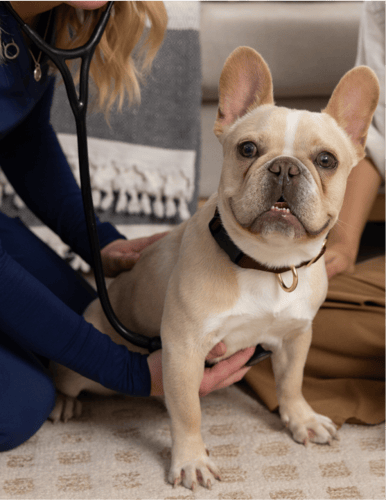
Why BetterVet?
Our mobile veterinarians examine pets in their favorite spot - a comfy couch, a cozy pet bed, or even your lap! See how we work to keep pets relaxed and happy at home.
BetterVet provides stress-free pet neutering, a safe veterinary procedure that is performed every day. Depending on your location, neutering can be performed in one of our mobile trucks, an on-site location, or at a partner veterinary hospital in your area.
Note: Surgical services are available in select locations. An in-home visit is required within the last two months before the date of surgery, or what is recommended by your veterinarian. To schedule your pet’s neuter, please fill out our General Surgery Inquiry Form.

The benefits of pet neutering include the prevention of unwanted litters and overpopulation. Your veterinarian will recommend the best age to spay your dog or cat.
Neutering your pet comes with a number of health benefits, including a decreased risk of certain kinds of cancers and other serious health problems. Intact males are prone to benign prostatic hyperplasia and testicular cancer.
Neutering your male dog or cat may also lead to positive changes in your pet's behavior, such as reduced aggression or marking.
All of our BetterVet veterinarians are Fear Free® certified and provide gentle, individualized care for your pet’s needs. They have expertise in routine veterinary neuter surgeries and will take the extra time to ensure that both you and your pet are comfortable from start to finish.
We’ll keep you informed about your pet’s surgical procedure every step of the way. You’ll have peace of mind knowing your pet is in good hands and we are here to address all of your questions and concerns.

A Pet Wellness Exam is required within two months of your pet’s neutering procedure. This is to make sure your pet is in good health and is able to tolerate anesthesia.

Your pet will be under anesthesia during the entire neuter surgery and will not feel any pain. Your pet will be closely monitored by both a veterinarian and a veterinary technician, who work as a team to ensure that your pet receives the best care possible.

During your pet’s neutering surgery (also called castration), both testicles are removed in order to sterilize (make infertile) a male dog, therefore stopping their ability to reproduce.

After your pet’s procedure, your veterinarian will prescribe pain medication to manage any discomfort. Your veterinary team will also explain how to care for your pet post-surgery, and any symptoms to watch for. Your pet should be feeling much better within a week’s time, but if not, we are here to help.

After your pet’s surgery, your veterinary team will provide all necessary prescriptions, instructions, and schedule follow-up visits if needed. If you have any questions or concerns about your pet’s recovery process, we are always just a phone call away.

Dr. and her assistant were absolutely amazing! She did a neutering surgery on one of my dogs and examined and did shots on both of them. They took time to make our pets comfortable and at ease. I will continue to use BetterVet in the future for our pet needs and will recommend them to everyone!
Most veterinary neutering procedures take between 20-60 minutes. Your veterinary team will monitor them closely before, during, and after the surgery and will let you know when your pet is ready to be discharged.
Before booking a pet neuter your dog or cat will need to be seen for a physical examination within the last two months to make sure they are healthy and ready for surgery.
Your veterinarian will be able to advise you regarding the best age for your cat or dog’s neuter surgery. Once your pet has been cleared for surgery after a Pet Wellness Exam, you can work with our Surgical Coordinator to find a time that works for you.
Depending on your individual policy, pet neutering may be covered by pet insurance. We will be happy to provide any records or assistance you need to submit your claim. Please let your veterinarian know ahead of time what documentation is needed to submit your claim for reimbursement.
Neutering surgery is a low-risk procedure performed by veterinarians every day. Your veterinarian will go over any risks involved with the surgery and the steps your care team will take to care for your pet during the entire process.
Your veterinarian will provide post-procedure care instructions for you to follow, including medication that is prescribed. If you have any questions about your pet’s follow-up care, do not hesitate to get in touch with us for additional guidance.
All of our veterinarians are qualified and trained to provide routine pet surgeries. Neutering surgery is a safe procedure that is performed by our experienced veterinarians on a regular basis.

Skip the traffic by booking a mobile vet visit with one of our trusted veterinarians. We bring full-service vet care to you!